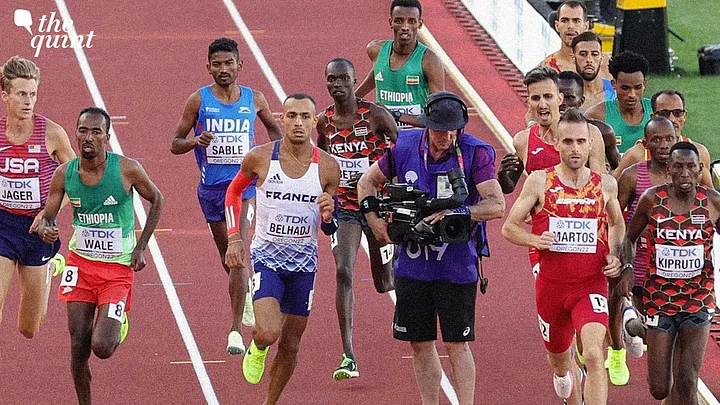Distance running has its thrills and chills. And tactics in events such as steeplechase can be tricky to gauge for a runner with little international experience.
Avinash Sable, India's poster boy, was not slow in the 3000m men's steeplechase final at the World Championships on Tuesday, he was trapped. The seasoned racers took his class and gave him a lesson to make him a better athlete.
They kept it slow and steady to have the last laugh.
The event at Oregon in the United States was the slowest final in the history of the World Championships.
Tokyo Olympic champion Soufiane El Bakkali of Morocco won the tactical race at 8:25.13 – his slowest time in a decade. In 2001, at Edmonton, Reuben Kosgei of Kenya nailed the race at 8:15.16.
Ethiopia’s Lamecha Girma (8:26.01) and Kenya’s Conseslus Kipruto (8:27.92) clinched silver and bronze respectively. Sable could not find a breakthrough moment to explode and clocked 8:31.75.
Tactics Over Speed; No Pace-Setters
To understand the tactical race, one needs to get into the mind of the steeplechase runners. El Bakkali is known for his final flourish. The athletics fraternity is aware of his last-lap exploits, Tokyo 2020 being one. Had the other racers exhausted themselves earlier, it would have been a cakewalk for the Moroccan, which it eventually was.
There are no pace-setters in the World Championship finals and the medal contenders, with experienced runners, usually set the pace in these races. They understand their bodies better, and they know when they can have burnout. And the pack follows them. Sable has not run enough in the international circuit to think shrewd. He was confused about whether to stick to his plan or follow the herd.
Sable is a great starter. To ensure a spot in the final, he went all out and set the pace in the qualification. The Indian tends to run out of gas towards the end but builds such a lead in the first few laps that it pushes him to a top-three finish. He clocked 8.18.75 in the qualification, 13 seconds less than the time he took in the final.
No Fatigue at All
The 27-year-old from Maharashtra came into the tournament on the back of impressive performances. He broke his national record multiple times. Sable had registered a national record timing of 8.16.21 at the Indian Grand Prix 2 in March, which confirmed his ticket to Oregon. At the Rabat Diamond League in June, he bettered the record with a timing of 8:12.48.
The man had been in sublime form until his opponents in the final hoodwinked him. Sable lost to tactics, strategy, and mental strength. There was no fatigue and he was not tired. His coach Scott Simmons clarified that his ward did not feel like he had run a race.
Though he tried to push himself after the first 1500 metres, he could not go ahead due to the barriers. He clocked 1.02.15 in the final 400m to record one of his fastest splits. Most of the racers stuck to the first three lanes where the barriers were. By the time he tried to overtake a competitor by racing outside, he had to return to his position to clear the barriers, which also lessens the pace of the racer.
Sable stayed behind and ran with the pack. He expected one of the Olympic medallists to break free but that never happened. There was a six-second difference between him and the gold medal.
What Sable Could Have Done, or Should Do
Elite athletes rarely go for straight shootouts. They conserve their energy and unleash themselves with a finishing kick, the skill that Sable lacks.
He could have fired on all cylinders from the outset to create the space to manoeuvre accordingly. But the lack of pace forced the runners to wear their thinking caps.
Sable should develop his finishing kick. He needs to back himself to take off in the final lap, like Bakkali.
"I think once Sable runs under 8:10, he will be confident to push the pace. It is a serious learning experience for him and the others. We assumed Girma and the Ethiopians would push but it never happened. It is difficult to hurdle when going that slow. We are now looking forward to the Commonwealth Games and there is no way it will be slow," said Simmons, while analysing the performance.
Being a farmer's son from the Beed region of Maharashtra, Sable has done the hard yard to come up through the ranks. He has served the Indian Army at the Siachen glacier and done cross-country running to turn a few heads in the athletics community.
In a week from now in Birmingham, he just needs to put his foot on the accelerator and dream of dashing to the finish line.
(At The Quint, we question everything. Play an active role in shaping our journalism by becoming a member today.)
